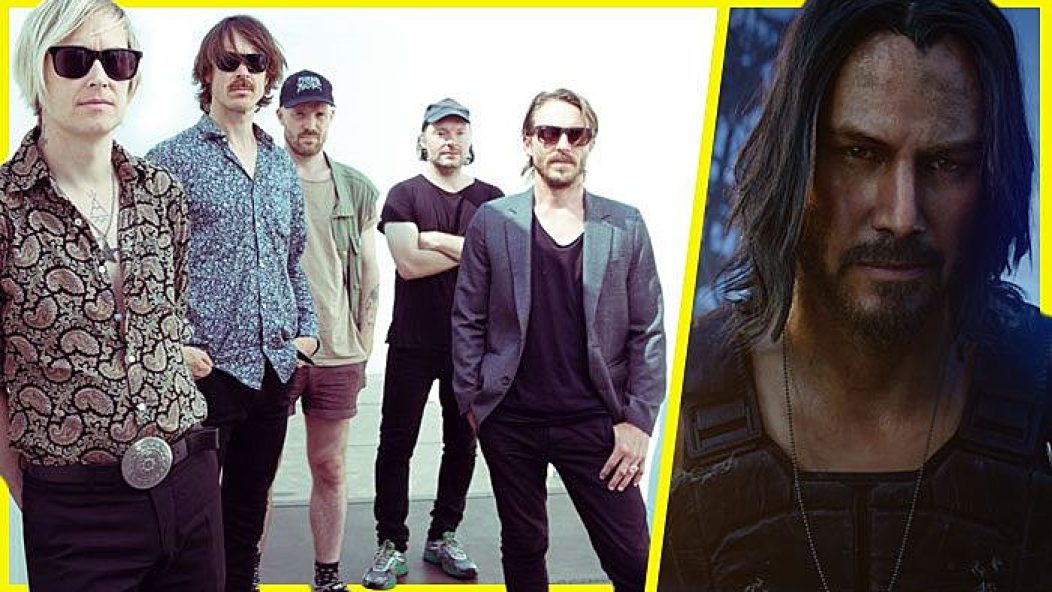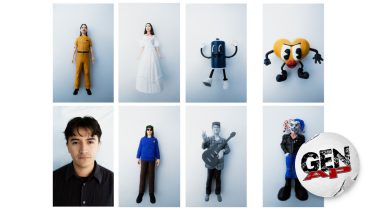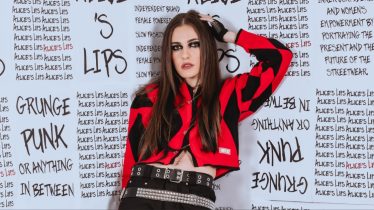
Refused dismantle punk (again) for dystopian video game ‘Cyberpunk 2077’
In 1998, Refused challenged the expectations of anyone who ever identified with a Strummer lyric or spun a Ramones record. Their acclaimed third album, The Shape Of Punk To Come, is a complete deconstruction of the punk-rock genre. Bouncing magnificently from avant-garde free jazz to slam dance-fodder hardcore, Refused turned punk into everything they thought it could be. Forecasting the “post-genre” direction currently dictating contemporary music, it only makes sense that Refused would be tapped, once again, to soundtrack the future.
The highly anticipated role-playing video game Cyberpunk 2077 takes place in the dystopian futurescape of Night City in 2077. Although the future is cluttered with mercenaries, “Braindance” tech and corporate control, punk rock permeates an endless flow of soft drinks and crime. At the center of it all, the punk-as-fuck band, Samurai, bring a swell of dissonance and discontent. In the game, Samurai are fronted by Johnny Silverhand, portrayed by renown actor, Keanu Reeves. Reeves is most well known for his role as Neo in The Matrix series and for kicking all kinds of ass as John Wick. He brings his distinct swagger and stoic cool to the role of Silverhand. But Refused injects pure venom-coursed adrenaline into Samurai’s music.
Read more: These 10 shock-rockers dared to take things to the highest extremes
Refused frontman Dennis Lyxzén spoke with Alternative Press about translating the progressive ethos of The Shape Of Punk To Come into the creed of the Johnny Silverhand-led Samurai. Lyxzén also opens up about the legacy of The Shape Of Punk To Come and how he thinks the future will remold punk.
The Shape Of Punk To Come is a substantial part of the legacy of Refused. How did that album prepare you to create the music of Cyberpunk 2077?
DENNIS LYXZÉN: It’s interesting because with the Cyberpunk project, it was so different from anything we had done with Refused. With The Shape Of Punk To Come, we were in the studio for six weeks, and we thought that’s mind-blowing long in those days. Six weeks from start to mix. But then the last two Refused records were about two years in the making. Going into Cyberpunk 2077 was interesting because, first of all, they had a pretty clear idea of what they wanted Samurai to be. They wanted it to be this futuristic, revolutionary band—kind of molded on Refused. So, what better band to do that than Refused?
It was also weird because it was two weeks of recording. [P.T.] Adamczyk, who was the composer for CD Projekt Red, came to Stockholm and met up with Kristofer [Steen, guitarist] and David [Sandström, drummer]. They’re recording basic tracking. They’re sending music to me. I’m doing lyrics and vocals at home. It was two weeks in a process that usually takes us about a year to finalize. I’m not sure we thought about that connection. But now, looking back at the process and whole Cyberpunk mythology, it makes sense that they wanted us to be this band. The band that defies genres. We did something a bit out of the box, and we have this revolutionary idea about what we want music and art to be, and it fits quite well into the whole Cyberpunk idea, actually.
Refused, to me looking at it from the outside, feel very reactionary to a lot of things. Be it music trends, be it politics, you’re reacting to something. Was it difficult for you and your band to react to a dystopian future that’s fictional? And how did you bring authenticity to that world?
No, it wasn’t [difficult]. You had to adjust the language a bit because I remember writing stuff and then sending it because everything had to be approved [by] the CD Projekt Red committee. There were a couple of times when they were like, “No, they wouldn’t say this in the future. They wouldn’t write about this in a song.” So there’s a couple of tweaks that we had to do. But looking at the world we live in right now and the direction we’re heading, it’s fairly easy to come up with talk about a dystopian future. In that sense, I think a lot of it came quite naturally. I think War Music was done two weeks prior to this. So it was right off the bat of, “OK, War Music is mixed. Let’s go into the studio to do this.” We had a couple of ideas. A couple of the songs were stuff that we didn’t finalize for War Music. We were like, “Oh, let’s do this and take it to the Samurai project.” It was fairly easy to come up with these ideas. But as I said, you had to tweak them and [ask], “How would Johnny Silverhand sing this?”
You said that Samurai were very much based on Refused. Was there anything completely out of character for Refused—maybe something you’ve wanted to try for a long time that you didn’t have a purpose to do in Refused, but you found a voice for in Cyberpunk 2077?
No, not so much. I think we’re pretty comfortable in Refused to go with our impulses. I think a record like Freedom shows that. We definitely went with what we felt like doing, and we’re pretty good at that. It was more about finding that tone to make it a band that wasn’t us, but kind of us, but in the future. To find that tone of what would rock music in the future sound like. So it was a little bit of that, but as far as trying stuff, we always try stuff. There’s some stuff that we try that no one’s heard, and for good reason, but we try.
The Shape Of Punk To Come has so many different movements and shifting of movements, and it’s an incredibly dynamic record. It’s one of the most dynamic punk records ever made. So much of that has translated into contemporary music now. Music is moving into normalizing the idea of being “post-genre.” What do you forecast for 2077, and what do you touch on in this soundtrack to project that? Where do you see punk music moving?
If I knew, I would make those records. [Laughs.] But I don’t know. It’s interesting because punk has been around for a long time now, and it’s always been that sort of abrasive, obnoxious, middle finger type of music. And with lines being blurred on how you create music and with what punk is, what hardcore is, there’s going to be a whole lot of interesting music in the future. There’s a bunch of bands that are completely doing something different. We toured with Youth Code on the last U.S. tour. That’s the best hardcore band I’ve ever seen, but it’s also an industrial band. I think that’s going to be something that we really see. Electronic music mixed with organic music. I think that’s going to be a huge shift and change. It won’t be as rigid.
[I] grew up being the guy that was 14 years old with a mohawk and [was] really like, “I’m a punk now.” I was a metal kid. I shaved my head and was like, “I’m now a punk.” To a lot of young people, genres don’t matter. Subculture doesn’t matter. It’s just like a big fucking smorgasbord. It’s a bit scary, but it’s also quite exciting because it means that you free yourself from the shackles of expectations, and I really love that. I would see that that is something that punk could be in the future and to a certain extent is today. It’s something that can free itself from the shackles of what it’s supposed to be or what people expect of it. That’s what we’re trying to do. We’re just going to do something that’s unexpected. We’re going to do something that we feel like doing.
How would you have defined punk and what punk music stood for when you were that 14-year-old mohawk kid? How has that changed you? How would you define it now?
When you’re young, it’s this idea, which is interesting because it’s still that idea to me. For some people, punk is a small room, and you just go in there, and you lock the door. That’s what punk is for some people. But for me, punk was this idea that I could do anything, and instead of this small room, we blew the walls off. We blew the roof off. I’m free to do anything. I’m free to fucking express myself in the way I want to express myself and always be true to myself and my ideas. That was what punk was to me when I was 15 years old and I discovered it. Maybe more so when I was young, it was very defining in how you looked and how you sounded as well. But that general idea [of] anything is possible. You can do whatever you want—just stay true to the course is still something I carry with me every day. Punk rock and The Shape Of Punk To Come are probably going to be the two biggest defining factors of my life. Ever. That’s pretty cool.
Cyberpunk 2077 will probably expose Refused to a lot of new people. Which song off each one of your records do you want people to go to next? If they’re hearing Refused for the first time, what’s the next step?
Obviously, “New Noise.” I’m not going to lie, that’s the reason why we’re here talking about this today. That song changed everything for us. If you hear the Cyberpunk 2077 soundtrack, you should check out “New Noise.” You should check out “Rather Be Dead” from Songs To Fan The Flames Of Discontent. Then, you should check out “Elektra” from Freedom and “Malfire” from War Music. Four songs of different Refused incarnations—and then you’ll have a pretty good idea [of] what type of band we are.
Cyberpunk 2077 is available for Xbox, PlayStation and PC beginning Nov. 19. Preorders are available now here, and you can see the trailer below.










